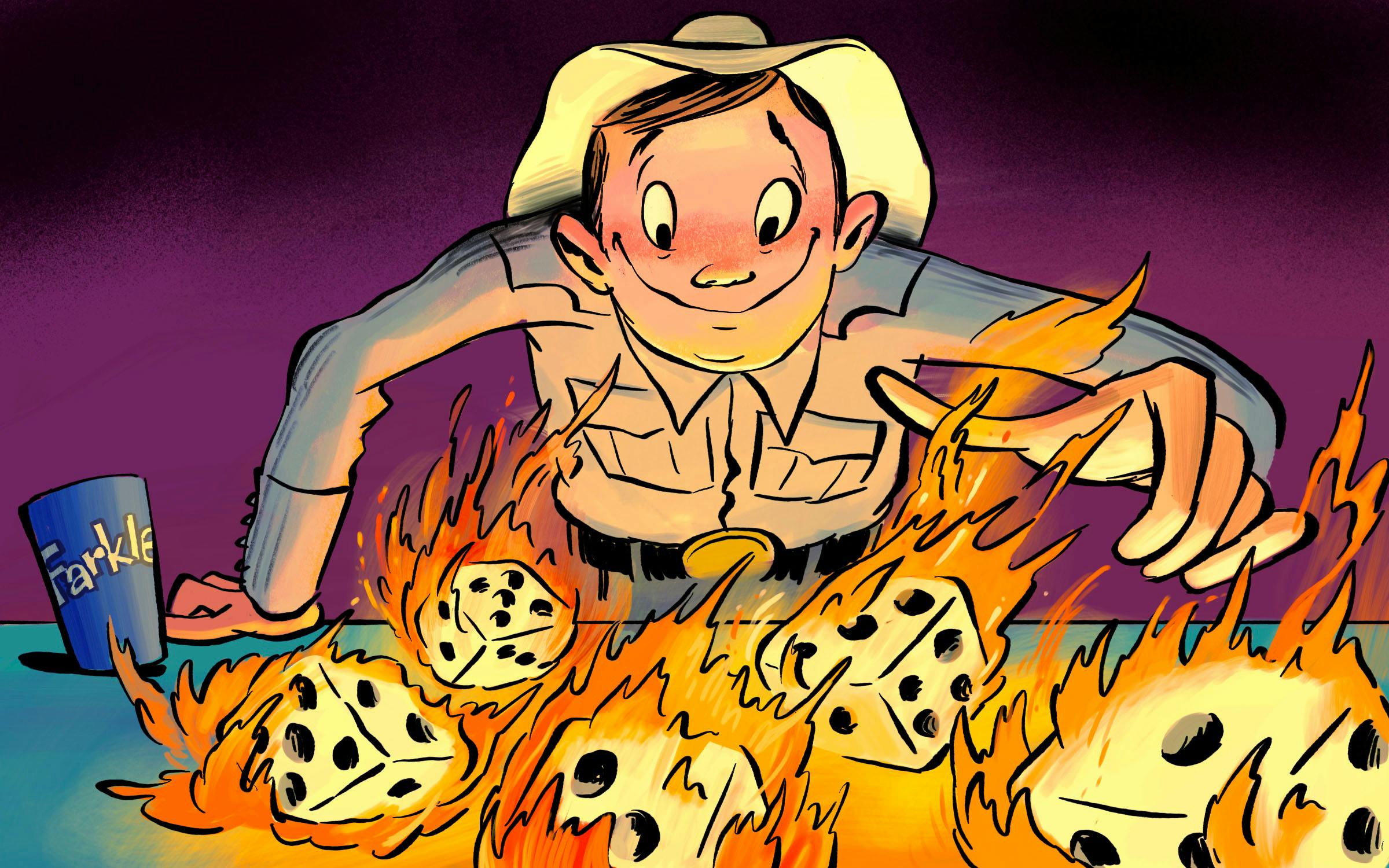Q: I recently participated in a “hot dice” tournament, which is basically a five-die version of farkle. I even wanted to yell “Farkle!” a few times but restrained myself. All of this makes me wonder: Where does farkle come from? The interwebs suggest it may come from Iceland—or Texas. Is farkle a Texas thing?
Rolling in Austin (a.k.a. Texas Monthly distinguished writer Russell Gold)
A: The Texanist has, over the years, enjoyed partaking in all sorts of games. He’s done this as a way to casually entertain himself, harmlessly pass the time, or, on occasion, seek out the exhilarating surge of endorphins that can only be found by putting the last thin dime he has to his name on the line, leaving it all to the mercy of a single roll of the bones, the flip of a card, or even a good ol’ fashioned “One! Two! Three! Rock, paper, scissors!”
Thankfully, Lady Luck, and not her lesser-known and lesser-regarded sibling, Sister Sorrow, has ridden shotgun for most of the Texanist’s time with such amusements. And speaking of good fortune, we Texans are blessed to share a home state with two of the greatest such games known to humankind—those, of course, being Texas hold ’em poker and the domino game 42.
The former’s exact origins are a bit murky, but there is widespread consensus that poker’s most popular variant was invented in some place and at some time in Texas. The latter was most definitely the brainchild of two youngsters in Trapp Spring (now Garner, some 45 miles west of Fort Worth) in 1887. But whether the world owes a similar debt of gratitude to the Lone Star State for farkle is a puzzler. As our letter writer notes, an internet search turns up pages suggesting that the game may be from either Iceland or Texas. The Texanist looked into the Iceland creation myth first, and he found little evidence to support it.
The farkle fable involving the Land of Fire and Ice (note that that’s fire and “ice,” not fire and “dice”) most always involves the character Sir Albert Farkle, a supposed English nobleman, who is said to have first played the game in Iceland during the fourteenth or fifteenth century. But the Texanist can find no record of such an English noble, especially an English noble who somehow found his way to Iceland in the 1300s.
The Texas claim, at least initially, seems to have more going for it. The Texanist is intrigued by the relation of farkle’s amusing appellation—”farkle” is a fun word to say—to the fact that one prominent theory has the game first being played not with dice but with dried farkleberries. The farkleberry, which is also sometimes known as sparkleberry, whortleberry, tree huckleberry, gooseberry, and winter huckleberry, is indeed native to Texas. The small tree or shrub, whose bluish-black berries are edible, can be found in forests and thickets across the eastern third of the state and much of the southeastern U.S. And no, farkleberries don’t grow in Iceland.
Now, all of this said, the Texanist is not, for the record, claiming that Farkle is 100 percent a Texas thing. He is unable to do so while keeping his integrity intact. The fact of the matter is that this game, unlike Texas Hold ’Em and 42 but exactly like many other such diversions, is, at the end of the day, a folk game. And since it is a folk game, there are as many or more variations of it as there are names for it. Players are free to settle on rules and scoring schemes as they see fit, though the owner of the dice—or dried farkleberries—will have the ultimate say. Players are also free to call the game whatever they want, and they do. Other names for farkle and similar games include but are not limited to 10,000, Chicago, Cosmic Wimpout, hot dice, squelch, Volle Lotte, zilch, and Zonk.
The game has also been commercially marketed numerous times over the years, including by a few enterprising Texans. One such group, out of Fort Worth in 1980, reimagined farkle for adult players complete with a rule book full of sexual innuendo (three of a kind was a “ménage à trois”) and double entendre. A decade later, another group, this one out of Canyon Lake, took a roll of the proverbial dice as a farkle marketer but had its efforts thwarted by a competing Dallas group that held the trademark at the time.
So, while the origins of such games are, by their nature, sometimes impossible to nail down, the names applied to the games are a little less so, and the Texanist, a gambling man, is willing to wager that farkle may have roots (farkleberry roots) in Texas.

